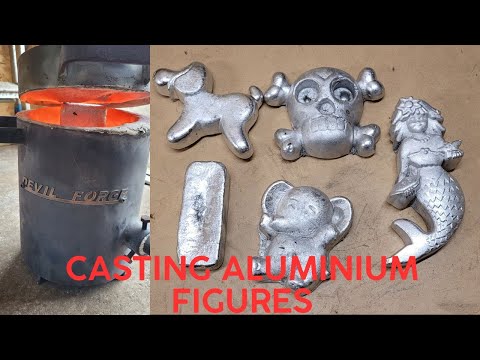The Of Stahl Specialty Company
The Of Stahl Specialty Company
Blog Article
7 Easy Facts About Stahl Specialty Company Described
Table of ContentsThe 8-Second Trick For Stahl Specialty CompanyThe Of Stahl Specialty CompanyThe 7-Second Trick For Stahl Specialty CompanyStahl Specialty Company Fundamentals ExplainedAn Unbiased View of Stahl Specialty Company
There are many minor distinctions between wrought and cast light weight aluminum alloys, such as that cast alloys can consist of much more substantial amounts of various other steels than wrought alloys. The most significant distinction between these alloys is the construction procedure via which they will go to provide the last item. Apart from some surface treatments, cast alloys will certainly leave their mold and mildew in practically the precise strong kind desired, whereas functioned alloys will certainly undertake several adjustments while in their strong state.If you think that a wrought alloy may be the ideal for your job, take a look at several of our write-ups that clarify even more regarding certain functioned alloys, such as Alloy 6061 and Alloy 6063. On the various other hand, if you believe a cast alloy would be better for you, you can discover more about some cast alloys in our Alloy 380 and Alloy 383 short articles (coming soon).

Having the experience and sector understanding to craft your spreadings for ideal manufacturing and high quality outcomes will simplify the job. Making aluminum castings calls for a complex set of processes to accomplish the ideal outcomes. When picking a brand-new light weight aluminum foundry to partner with, ensure they have extensive market experience and are educated about all elements of the aluminum casting procedure: design, production, material evaluation, and item screening.
The Best Strategy To Use For Stahl Specialty Company
The foundry should also have a proven performance history of supplying exceptional items that satisfy or surpass client expectations. Quality control ought to likewise be at the top of your list when choosing an aluminum foundry. By functioning with a certified factory that complies with the requirements for quality assurance, you can secure the stability of your product and ensure it fulfills your specs.
By selecting a firm that provides services that meet or surpass your item demands, you can be sure that your job will be completed with the utmost accuracy and efficiency. Particular click to read aluminum factories focus on particular sorts of manufacturing procedures or casting approaches. Various parts need various manufacturing techniques to cast aluminum, such as sand spreading or pass away spreading.

Pass away casting is the name offered to the procedure of producing intricate metal components via use mold and mildews of the component, likewise called dies. The procedure makes use of non-ferrous metals which do not have iron, such as aluminum, zinc and magnesium, as a result of the preferable residential properties of the metals such as low weight, greater conductivity, non-magnetic conductivity and resistance to corrosion.
Getting The Stahl Specialty Company To Work
Die casting production is fast, making high production levels of components easy. It produces more elements than any kind of various other procedure, with a high level of precision and repeatability. To discover more about die casting and die casting products used in the process, continued reading. There are three sub-processes that fall under the classification of die spreading: gravity die casting (or permanent mold and mildew spreading), low-pressure die casting and high-pressure die casting.
Regardless of the sub-process, the die casting process can be broken down right into 6 steps. After the pureness of the alloy is evaluated, passes away are created. To prepare the dies for spreading, it is essential that the dies are clean, to make sure that no residue from previous manufacturings stay. After cleansing, the ejection lubrication is put on the die to guarantee a smooth release.
The pure steel, also referred to as ingot, is contributed to the furnace and maintained the molten temperature of the steel, which is then transferred to the shot chamber and injected right into the die. The pressure is then maintained as the steel solidifies - aluminum foundry. As soon as the steel solidifies, the cooling procedure begins
The thicker the wall surface of the part, the longer the cooling time as a result of the quantity of interior metal that likewise requires to cool down. After the part is completely cooled down, the die halves open and an ejection mechanism presses the part out. Adhering to the ejection, the die is shut for the following shot cycle.
Unknown Facts About Stahl Specialty Company

However, this verified to be an incorrect test, because the tester can cut right into an item and miss out on an area with porosity. Today, leading makers utilize x-ray testing to see the entire inside of parts without cutting right into them. This enables them to more properly approve or reject components. To get to the finished item, there are three key alloys utilized as die casting material to select from: zinc, light weight aluminum and magnesium.
Zinc is one of the most used alloys for die spreading due to its lower cost of raw materials. Its corrosion resistance likewise enables the parts to be long lasting, and it is one of the a lot more castable alloys due to its lower melting factor - Aluminum Casting.
The Of Stahl Specialty Company
As mentioned, this alloy is one of the most commonly utilized, yet manufactures will, sometimes, choose light weight aluminum over zinc due to light weight aluminum's production advantages. Aluminum is highly affordable and one of the a lot more versatile alloys. Aluminum is used for a number of various products and industries anything from window frames to aerospace products.
Report this page